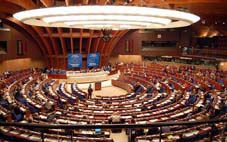Europe expresses concern over Georgia
By Etuna Tsotniashvili
Friday, June 26

The resolution reads that both states committed serious human rights violations during the war and in its aftermath and again called on them to investigate allegations of human rights violations and take the measures ordered by the European Court of Human Rights and International Court of Justice and any forthcoming judgments which will be made by these courts.
In this resolution PACE also mentions the recent internal political developments in Georgia and states that attacks on protestors in Georgia are “a matter of serious concern”. “In Georgia, the growing number of attacks by unknown assailants on opposition activists and peaceful demonstrators participating in the protest rallies that started as of 9 April 2009 is a matter of serious concern and needs to be fully investigated,” the resolution states.
Georgia also appears in the PACE list of countries where the excessive use of force and ill-treatment by the police continue to be issues of concern. The full list is Albania, Armenia, Azerbaijan, Bosnia and Herzegovina, Bulgaria, Georgia, Moldova, Russia, "the former Yugoslav Republic of Macedonia", Turkey and Ukraine.
As regards freedom of expression, the resolution states that there is little editorial independence and low professional standards and self-censorship in Georgia, although the Law on Freedom of Speech and Expression was considered a model for the region. However there is a big problem with the media in Russia. According to PACE media pluralism has declined in Russia in the last two years. “The self-censorship existing in many media outlets is an obstacle to freedom of expression. The Assembly welcomes the preparation of a new draft law, which provides inter alia for a clear list of the rights of journalists and recommends that the competent governmental authorities in Russia consult the Council of Europe on the new draft media law.”
Concerning refugees and IDPs PACE identifies Bosnia and Herzegovina, Georgia and Serbia as countries in which a synergy has developed between the Monitoring Committee and the Commissioner for Human Rights throughout the reporting period, in particular, as regards the handling of the war between Georgia and Russia and the post-electoral crises in Armenia and Moldova. Finally, the Assembly urges all states currently under monitoring or engaged in a post-monitoring dialogue to step up their co-operation with the Monitoring Committee and to implement all the recommendations contained in the country-specific resolutions adopted by the Assembly, as well as those issued by the Commissioner for Human Rights and other Council of Europe institutions and monitoring bodies. It reaffirms its readiness to provide the necessary support to the countries concerned through its Parliamentary co-operation and assistance programmes.
Political analyst Shalva Pichkhadze thinks that such criticism from PACE will not affect the Georgian Government. “I don’t think the PACE resolution will have any influence on the Georgian Government or decrease the number of attacks. PACE criticism can be authoritative but it does not mean anything to the Georgian authorities,” Pichkhadze told the Messenger.
Currently eleven countries are under a PACE monitoring regime: Albania, Armenia, Azerbaijan, Bosnia and Herzegovina, Georgia, Moldova, Monaco, Montenegro, the Russian Federation, Serbia and Ukraine.
